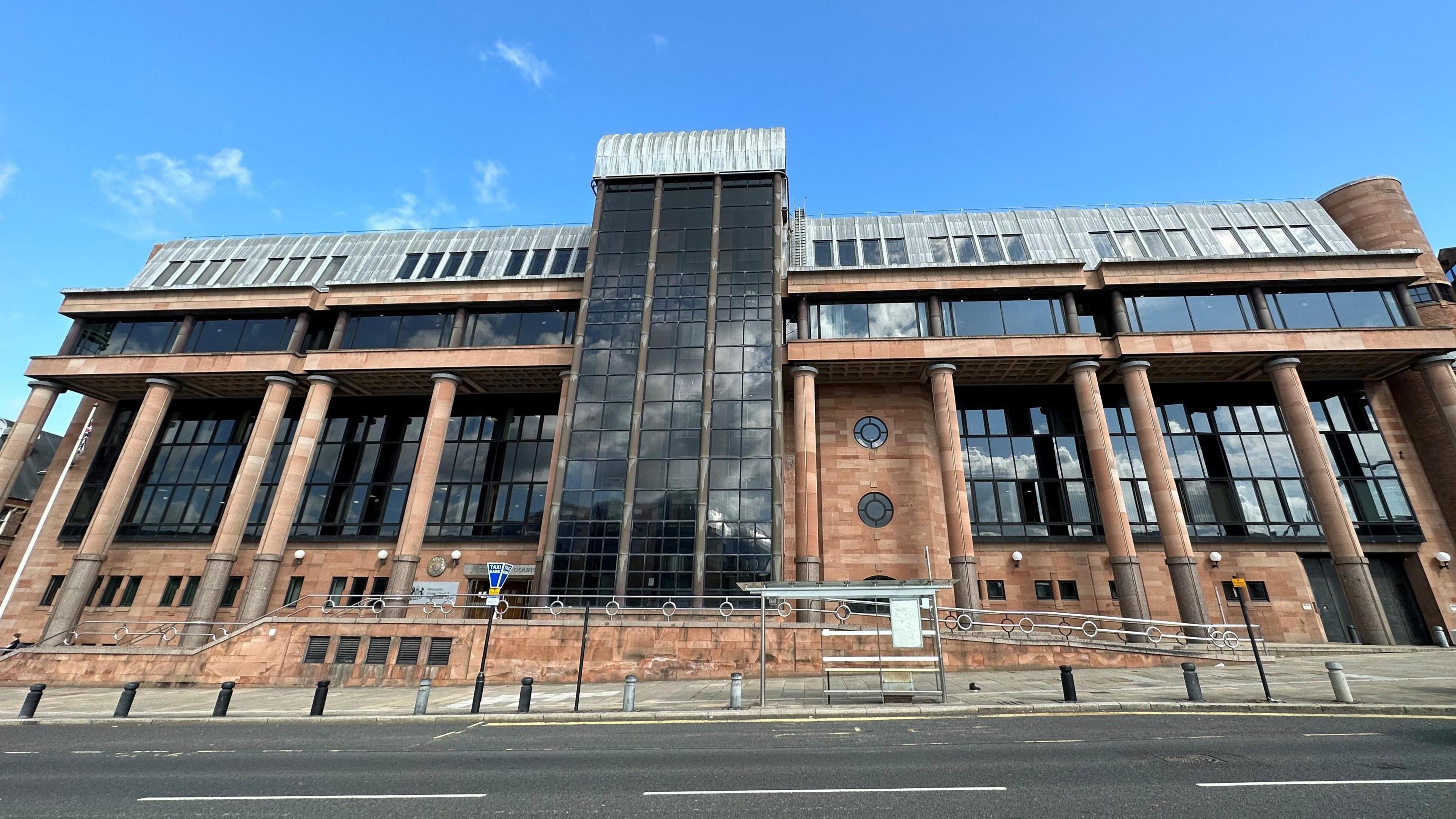Drug gang spared jail after four-year court delay

Sentencing took place at Newcastle Crown Court
- Published
Three drug dealers have been spared jail after their case took four years to pass through the court system.
Kelly Wilkinson, 39, and her partner John Hunstone, 46, ran a crack cocaine gang in Northumberland with their friend Ashleigh Weatherstone, 35, and her ex-partner in late 2020 and early 2021, Newcastle Crown Court heard.
Their barristers said the trio had turned their lives around in the intervening years and had endured significant anxiety as they waited four years to learn their sentence outcome.
All three were given suspended prison sentences after admitting drug-dealing offences.
The gang were caught when police found the two women with cash and drugs in an Audi at a petrol station near Bedlington on 12 January 2020, judge Carolyn Scott said.
Hunstone was later discovered with a large quantity of heroin and crack cocaine which was being repackaged into smaller packets at his home.
It subsequently took two years for their case to reach court, with all three admitting their offences in May 2023, the court heard.
There was then another two-year delay - in part due to Weatherstone disputing aspects of the prosecution case, which required a separate hearing- before they were finally sentenced on Tuesday.
The court heard there were "various reasons" for the delays, ranging from reports not being prepared as requested and the unavailability of court space and barristers.
'Turned life around'
All three had been addicted to drugs in 2020, and sold crack cocaine to fund their own habit - with the two women having a "significant role" in the dealing operation, according to prosecutor Peter Sabiston.
Andrew Walker, representing Wilkinson, said a "lot of water [had] passed under the bridge" in the intervening years, and stipulated the delays were not her fault.
Wilkinson had been "blighted" by a Class A-drug addiction that, for many years, was a "lifelong struggle" from which "very few people are able to emerge unscathed", Mr Walker said.
But she had "completely" turned her life around, to the point where she had successfully concluded programmes with addiction recovery services, and had since had a child with Hunstone, the court heard.
Mr Walker said she had found the uncertainty of her future, caused by the court delays, "extremely difficult", but it had "allowed her to show to everyone else she is capable of turning her life around".
"She couldn't have done very much more in her case to show all of this is well and truly behind her," Mr Walker said.
Mental health issues
Kate Barnes, representing Hunstone, said he had been left with severe post-traumatic stress disorder and other serious mental health conditions following his service in the army, and had been preyed upon by other drug dealers for his pension, which was now almost totally depleted.
However, over the past four years, he made "significant progress" to address both his mental health and drug use and was now routinely returning clean samples, Ms Barnes said.
He too was not responsible for the court delays, the court heard.
Prospect of rehabilitation
Part of the delay was caused by Weatherstone submitting a basis of plea - namely that she was being coerced into drug dealing by her ex-partner - which had required a separate session, known as a trial of issue or Newton hearing, the court heard.
Weatherstone's barrister, Liam O'Brien, said she was not at fault for much of the "extraordinary" delay, and said not knowing if, or when, she might go to prison had taken a "toll" on her mental health.
He said Weatherstone, who had a traumatic history as well as various serious mental health conditions, had demonstrated "remorse" and had made "significant steps" to address her problems and drug addiction.
"She is, and always be, a drug addict, but [she] is no longer using any of the drugs she was using at the time she committed these offences," Mr O'Brien said.
He stressed Weatherstone had made "extraordinary progress in turning her life around during the period of delay".
Judge Scott said, although Weatherstone had been subjected to domestic violence, she found Weatherstone had taken part in the drug dealing of her own "volition".
The judge said drug dealers should "ordinarily" be jailed as "punishment", and all three might have faced potential jail terms of between three and seven years.
But she acknowledged the efforts they had made, the impacts of the delays, and said there was a "realistic" prospect of rehabilitation for each of them.
Wilkinson, of Millbank Terrace in Bedlington, and Weatherstone, of Sampson Close in Morpeth, both admitted being concerned in the supply of Class A drugs.
Wilkinson was jailed for 21 months, suspended for 18 months, while Weatherstone was jailed for two years, suspended for a year and a half, along with 100 hours unpaid work.
Hunstone, of the same address as Wilkinson, admitted two counts of possessing Class A drugs with intent and was jailed for 19 months, suspended for 18 months.
All three were ordered to carry out activities with the probation service, while Weatherstone was also ordered to pay a £100 fine for missing an earlier court date which her barrister claimed had been caused by her "confusion".
Follow BBC North East on X, external, Facebook, external, Nextdoor and Instagram, external. Send your story ideas here, external.